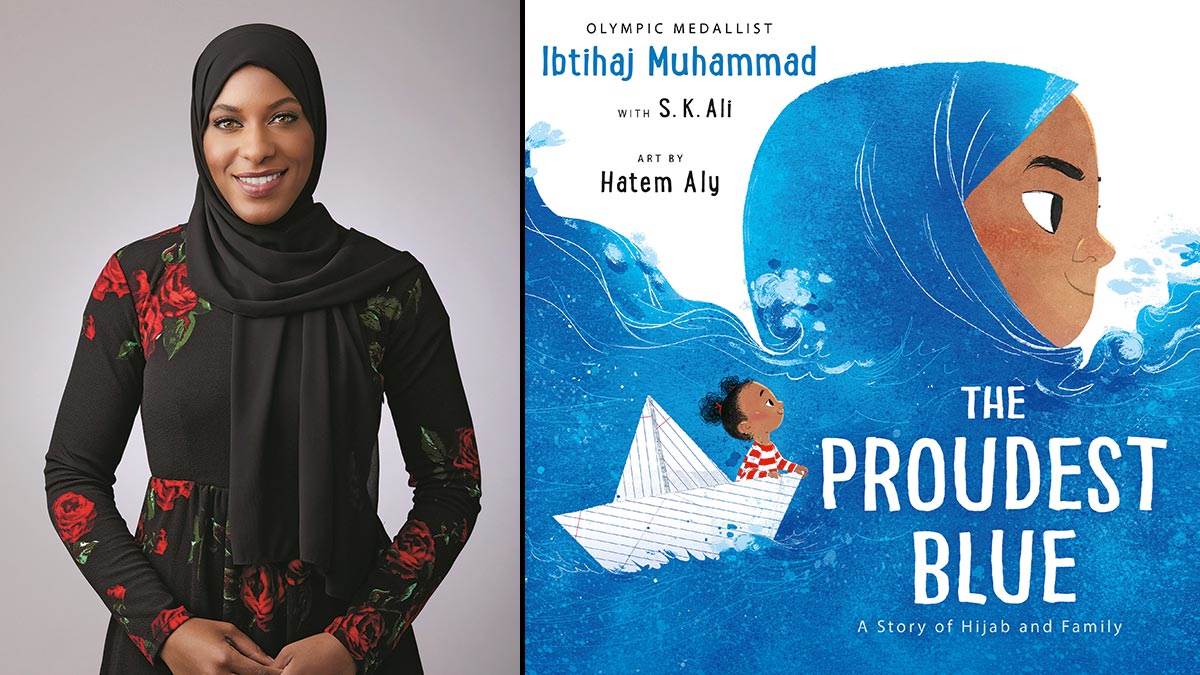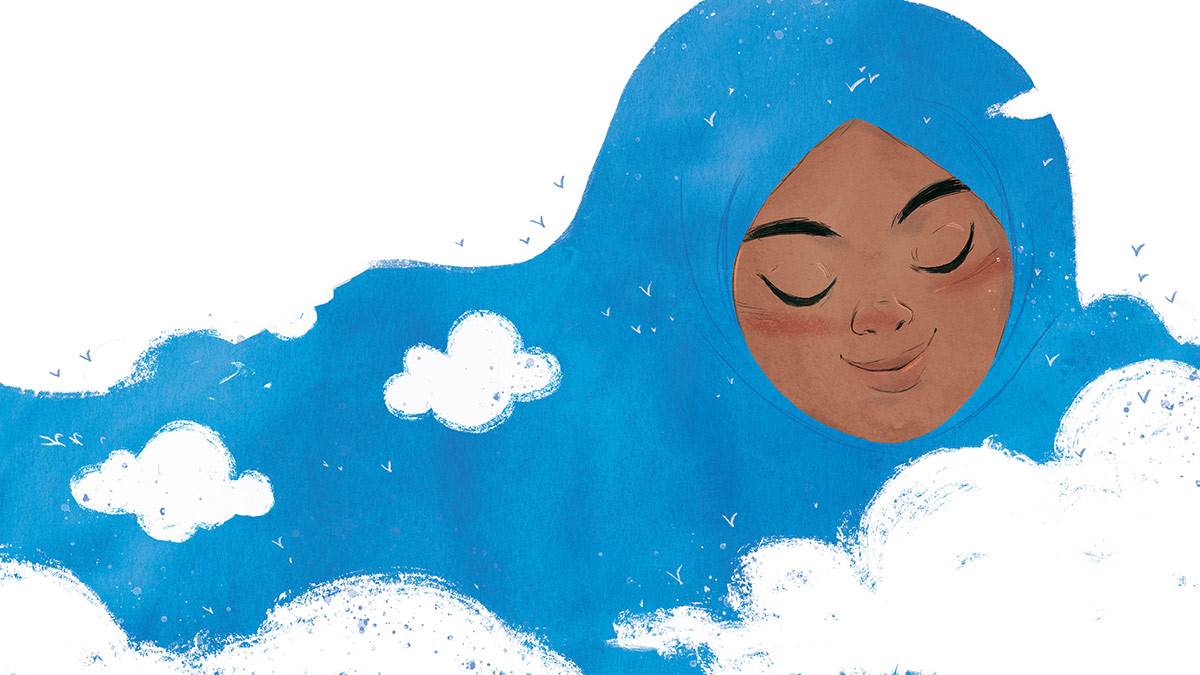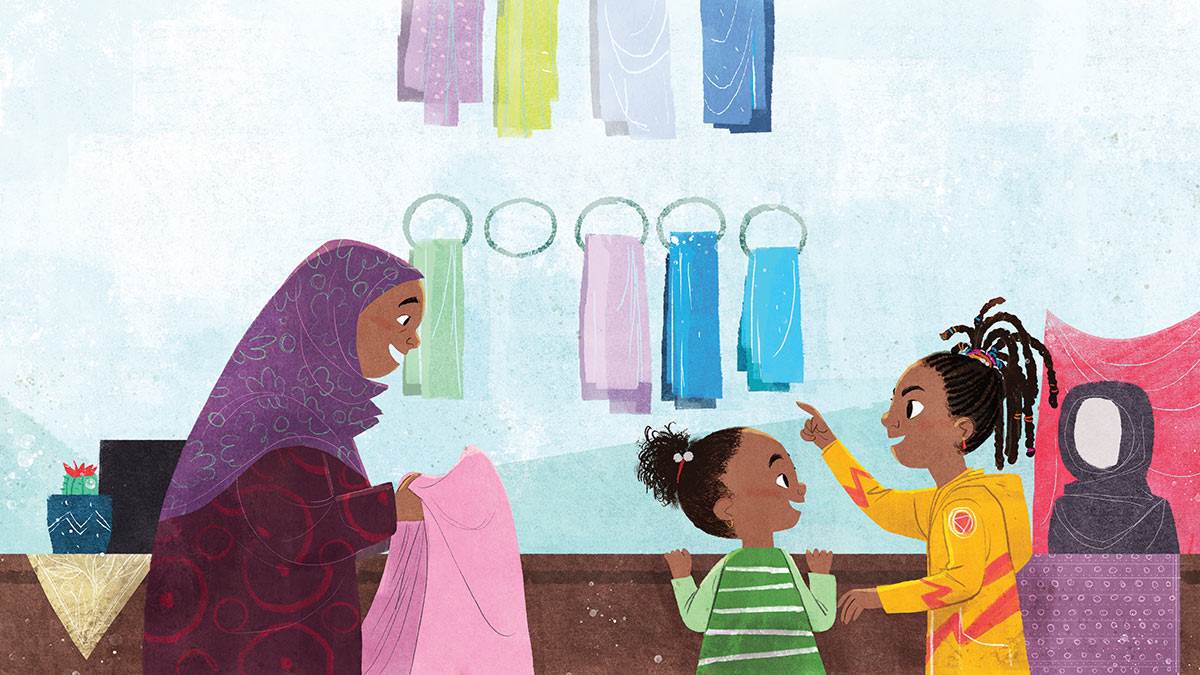'I didn't see myself in children's books': Olympian Ibtihaj Muhammad on writing for kids
Published on: 12 May 2020
Growing up in America, Ibtihaj Muhammad never saw herself in children's books. Now that she's an Olympic medallist in fencing, she's released The Proudest Blue - and tells us here how she hopes it will help kids pursue their dreams...

Photo: Heidi Gutman-Guillaume
I've never been a fan of boundaries. When there was an obstacle placed in my path, I would quickly resolve to push it out of the way. Throughout my life, I've used the values my parents instilled in me as a child - like hard work, love, and faith - to overcome challenges.
I am the picture of the American Dream - growing up in New Jersey, a public school kid, with loving parents who told me that with hard work and perseverance, anything was possible. I enjoyed family holidays, swimming in the pool, riding bikes around the neighbourhood, and countless other adventures with my siblings and friends.
If you didn't know me or know what I look like, you might never guess from my quintessential American experiences and values that I am often othered because of the colour of my skin and my faith.
As an African-American and Muslim woman, I have come to know what discrimination feels like, learned how to overcome those obstacles, discovered a passion for being an agent of change and now understand that it is our collective responsibility as a people to honour each other's potential.
Fighting to realise my dreams

Illustration: Hatem Aly
Breaking barriers was a motivating factor for me throughout my athletic career. Growing up, I did not see sportswomen who looked like me. Taking on the challenge of qualifying for Team USA was not only an opportunity for me to challenge society's limited expectations of me as a Muslim woman, but also an opportunity to make sure Muslim girls and women around the world would see themselves in sport. I leaned on my family for support, called on my faith to get through those difficult moments, and realized that my work ethic and commitment had to be unmatched in order for my dreams to be realised.
By believing in myself and refusing to take no for an answer, I have broken barriers and shattered stereotypes. I was the first Muslim woman to represent the United States at the Olympic Games wearing hijab and went on to become the first American Muslim woman to win an Olympic medal when I captured the bronze alongside my team at the Rio Games.
Walking into that Olympic stadium in Rio de Janeiro, wearing red, white (hijab) and blue, with over three billion people watching all over the world, was one of the greatest moments of my life.
I was a Black Muslim woman in a little-known sport. And on the world's biggest stage, I defied assumptions and showed the world that being Muslim could also mean being American.
The Olympic Movement chose its symbol of interlocking rings of many different colors to demonstrate humanity's unity. The beauty of sport, the great equalizer, is that it brings people together. My journey to get to the Games was not an easy one, but my teammates and I did what we had to do in order to prevail. Despite our differences and the tumultuous moments we went through as a team, together we rallied with a medal on the line.
As we clinched the bronze medal, I was overcome with emotion. My teammates and I hugged, celebrated and basked in the glory. For a moment, I forgot about every hardship and revelled in the satisfaction that all of the hard work, tears, sacrifices, injuries, and anguish were worth it.
Standing under the stars and stripes of the United States flag on the Olympic podium was so surreal. I had grown up watching the Olympics on television and never imagined myself here - an Olympic medalist. One by one our names were announced, and our medals were carefully placed over our heads. I remember looking up into the rafters and thanking God for opportunity to not only win a medal, but also to represent myself, my family and my communities well.
Despite the obstacles and the never-ending chorus of naysayers, I had accomplished what I set out to do with my saber, and it was the sweetest feeling of satisfaction I had ever had. And what I love most about my Olympic experience is that my success was born out of my opportunity, freedom and liberty as an American.
I defied society's limited expectations of what an African-American woman can do in a historically white sport, a sport that had never seen a hijabi in its elite ranks before. And at the highest level of sport, on the world's biggest stage, I proudly represented my country.
Faith and sport have been key elements in my life - guiding forces that have made me a strong American. These powerful magnetic forces bring people together and it is my mission to advocate for change and encourage each of us to draw strength from our diversity. Our power is in our difference.
Helping children to feel empowered through books

Illustration: Hatem Aly
Being unapologetic about who I am has always been an act of resistance. Early in my pursuit of my Olympic dream, I decided to make a commitment to myself to defy assumptions, exceed expectations and break barriers. Shocking experiences with discrimination and doubt have only pushed me even more to continue living my mission fully and being unapologetic in my faith and commitment to inclusion. My journey has always been bigger than fencing and it is my hope to leave a legacy that transcends sport.
When I was a kid, I did not see myself represented in children's literature. The Proudest Blue is a critical step in bringing representation to the pages of picture books. I wanted to tell this story so that children of colour and those who wear hijab could see themselves in the characters and in a story that shares their experience.
I started wearing hijab every day when I was 12. Before then, my mother would have me wear hijab on special occasions and to school when I didn't have gym. It made the transition to wearing hijab every day easier.
But even though my parents did a great job preparing me spiritually and physically for covering my hair, I faced bullying from classmates because of the way I showed my faith. I have a vivid memory from middle school when a boy asked me why I was wearing 'that tablecloth' on my head.
I realised in that moment that my faith had the power to change how people treated me and that I may be othered - all because of my hijab. It took time for me to arrive to the place where I could brush off the looks and ignore the haters. It wasn't easy and I am sure girls today face the same treatment - or worse.
The Proudest Blue has a message about faith, family and finding strength in the face of adversity. I wanted to tell this beautiful story so that children of colour would see two sisters taking pride in hijab and know that the parts of ourselves that might make us appear 'different' are worth celebrating. So that children of colour, Muslims, and both (like me) know they aren't alone and that there are many out there with a shared experience.
My hijab is a testament to my faith, my freedom and my love of Allah. It's a tradition I share enthusiastically with my mother and sisters. My hijab is beautiful. To the young girls out there reading this story who are hijabis, so is yours.





